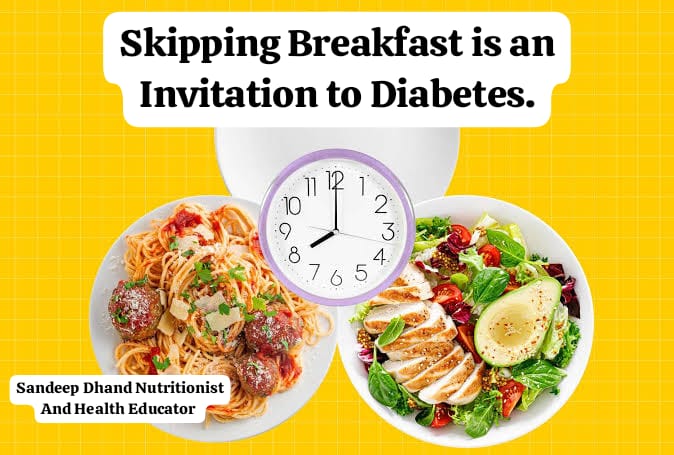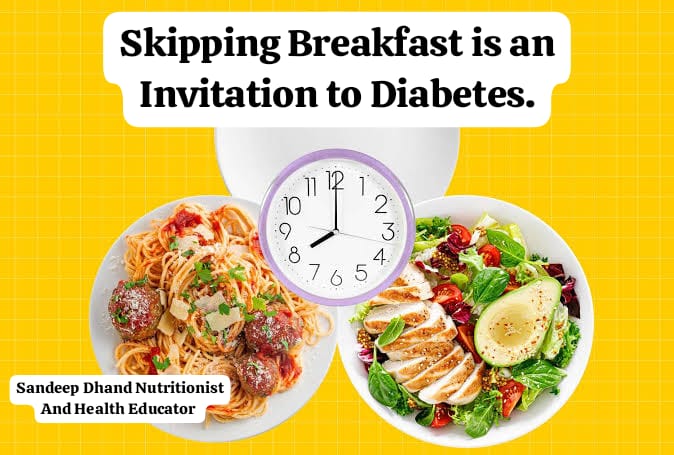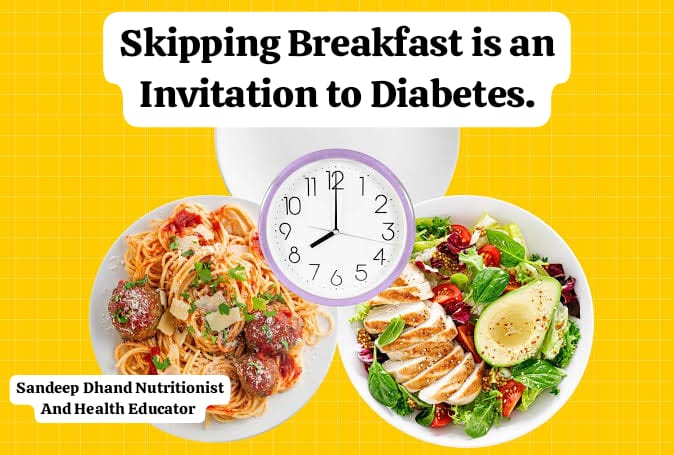Sandeep Dhand
Nutritionist And Health Educator
In today’s fast-paced world, many people tend to skip breakfast, considering it an easy way to save time or reduce calorie intake. However, this seemingly harmless habit can lead to several health issues, especially concerning blood sugar levels. Let’s explore how skipping breakfast affects your body, particularly your blood sugar, and why starting your day with a nutritious meal is crucial.
What Happens When You Skip Breakfast?

Breakfast is often referred to as the most important meal of the day, and for good reason. After a long night of fasting, your body relies on breakfast to replenish energy levels and maintain stable blood sugar. Skipping this meal can cause:
- Fluctuations in Blood Sugar Levels: When you don’t eat in the morning, your blood sugar drops. This can make you feel tired, irritable, and unfocused. To compensate, your body may release stored glucose, which can lead to a sudden spike in blood sugar later when you eat.
- Insulin Resistance: Regularly skipping breakfast may lead to insulin resistance, where your cells don’t respond well to insulin. This increases the risk of developing type 2 diabetes over time.
- Overeating Later: Missing breakfast often results in overeating during lunch or snacking on unhealthy options, which can further disrupt blood sugar balance.
The Link Between Skipping Breakfast and Diabetes

Several studies have shown a direct link between skipping breakfast and a higher risk of type 2 diabetes. When you skip breakfast regularly, it affects your body’s ability to regulate insulin and glucose. This can lead to chronic issues like:
Elevated Blood Sugar: Fasting for too long can make your liver release excess glucose into the bloodstream.
Weight Gain: Missing meals can slow down your metabolism and lead to unhealthy food choices, which contribute to weight gain—a major risk factor for diabetes.
Hormonal Imbalance: Skipping breakfast can disrupt hormones like cortisol and insulin, which are crucial for blood sugar management.
Why Breakfast is Important for Sugar Control
Eating breakfast kickstarts your metabolism and helps maintain stable blood sugar levels throughout the day. A balanced breakfast provides your body with essential nutrients like:
Carbohydrates: To restore glucose levels after fasting.
Protein: To keep you full and prevent cravings.
Fiber: To slow down the release of glucose into the bloodstream.
Healthy Fats: To support overall energy and hormonal balance.
For people with or at risk of diabetes, skipping breakfast can worsen their condition by making it harder to control blood sugar levels after meals.
Effects of Skipping Breakfast on Overall Health
Skipping breakfast doesn’t just affect your blood sugar; it can lead to other health issues, such as:
- Heart Problems: Studies suggest that people who skip breakfast are more likely to develop heart diseases due to increased cholesterol and blood pressure.
- Reduced Cognitive Function: Without breakfast, your brain may not get enough energy to function optimally, leading to poor concentration and memory.
- Mood Swings: Low blood sugar can make you feel cranky or anxious, affecting your mood and productivity.
Who is Most at Risk?
While skipping breakfast can be harmful to anyone, some groups are more vulnerable:
People with Diabetes: Skipping breakfast can make it difficult to manage blood sugar levels effectively.
Pregnant Women: They need regular meals to maintain stable blood sugar and support their baby’s growth.
Children and Teens: Breakfast is crucial for their growth, development, and academic performance.
Busy Professionals: Stress combined with irregular eating habits can worsen health outcomes over time.
Healthy Breakfast Ideas for Blood Sugar Control
A healthy breakfast doesn’t have to be complicated. Here are some easy and nutritious options:
- Oatmeal with Fruits: A bowl of oatmeal topped with fresh fruits and nuts provides fiber and slow-releasing carbs.
- Greek Yogurt with Berries: This combination offers protein, antioxidants, and natural sweetness.
- Eggs with Whole-Grain Toast: Packed with protein and healthy fats, this is a perfect start to your day.
- Smoothies: Blend spinach, a banana, some yogurt, and a handful of nuts for a quick and filling meal.
- Daal Cheela or Moong Dal Pancakes: These are high in protein and pair well with a side of curd.
Tips to Make Breakfast a Habit

If you’re not used to eating breakfast, here are some tips to incorporate it into your routine:
- Start Small: Begin with a light breakfast like a fruit or a handful of nuts.
- Plan Ahead: Prepare overnight oats or boiled eggs the night before to save time.
- Set a Reminder: Use alarms to remind yourself to eat in the morning.
- Keep It Simple: Choose meals that are easy to prepare and enjoyable to eat.
Frequently Asked Questions
- Can skipping breakfast lead to weight loss?
Not necessarily. While it might seem like a way to cut calories, skipping breakfast often leads to overeating later in the day, causing weight gain. - What should I eat if I have high blood sugar?
Focus on foods with a low glycemic index, such as whole grains, vegetables, and lean proteins. Avoid sugary cereals and pastries. - Is intermittent fasting harmful for blood sugar?
Intermittent fasting can be beneficial for some people, but skipping breakfast as part of fasting may not suit everyone, especially those with blood sugar issues. - How does breakfast affect energy levels?
A balanced breakfast provides the fuel your body needs to function efficiently, improving focus and reducing fatigue.
Final Thoughts
Skipping breakfast might seem like a harmless habit, but it can have significant consequences for your blood sugar levels and overall health. Starting your day with a nutritious meal can stabilize your energy, improve your mood, and reduce the risk of chronic conditions like diabetes and heart disease.
Remember, small changes can lead to big improvements. Make breakfast a priority, and your body will thank you!
